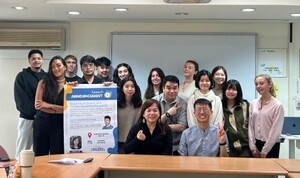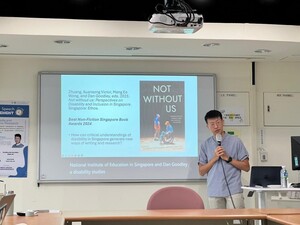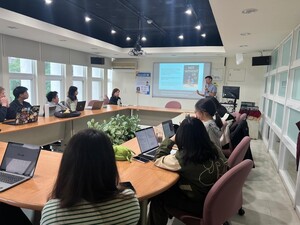Disability in Media and Communications: Nanyang Technological University Dr. Victor Zhuang gave a talk



【Article by College of Communication】
Dr. Kuansong Victor Zhuang, the Assistant Professor from the Wee Kim Wee School of Communication and Information, Nanyang Technological University, gave an inspirational talk about “Inclusion and Disability in Communication Research” for Distinguished Professor Trisha Lin’s “New Media Convergence” course in early March 2025. at National Chengchi University (NCCU). Regarding disability inclusion as a crucial yet often overlooked global issue, Dr. Zhuang explored how digital technologies and AI shape disability inclusion in Singapore and and beyond.
The Importance of Disability Inclusion
Dr. Zhuang emphasized that while race, gender, and class are widely studied, disability has only recently gained attention. A compelling message that he shared: “disability should not be viewed as a matter of charity or pity but as an opportunity to rethink how we design media, technology, and society.” He referenced the Social Model of Disability, which argues that societal barriers—such as inaccessible environments and biased media—disable individuals rather than their conditions alone. He also highlighted the United Nations Convention on the Rights of Persons with Disabilities (CRPD) as a framework guiding inclusion efforts globally.
Technology and Digital Accessibility
Technology plays a dual role in disability inclusion. While AI tools like automated captions and sign language interpreters can aid accessibility, they also reflect biases that exclude disabled users. Dr. Zhuang cited examples of AI-driven hiring discrimination and media representation issues, calling for ethical and inclusive AI policies.
Singapore’s Enabling Masterplan and agencies like SG Enable have made strides in digital inclusion. He also discussed research on the Singpass app, highlighting how national digital identity systems can incorporate accessible design.
Disability as a Driver of Innovation
Dr. Zhuang introduced his award-winning book, Not Without Us: Perspectives on Disability and Inclusion in Singapore, which explores how disability-centered approaches lead to innovations benefiting society. He cited universal design principles, such as curb cuts and voice-activated technologies, originally created for disabled individuals but now widely used.
Engaging Students and the Future of Disability Studies
During the Q&A, students asked about disability data collection and shifting societal attitudes. Dr. Zhuang noted that Singapore only began publishing disability statistics in 2020, but challenges remain in defining and addressing needs. He stressed that legal protections exist but that true inclusion requires long-term societal change.
Through this talk, Dr. Zhuang reinforced that disability should not be viewed through charity or pity but as an opportunity to rethink media, technology, and social structures to create a more inclusive world.
